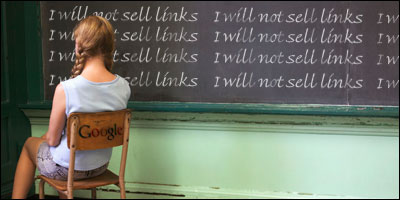Google continues to beat the drum about passing PageRank through paid links as Matt Cutts weighed in on the topic with another request that webmasters use the 'nofollow' attribute for them.
 |
| Paid Links Still Evil To Google |
Though plenty of places in the Northern Hemisphere shiver in chilly temperatures, webmasters will continue radiating heat after the latest double-barreled barrage from Google's loquacious engineer. Paid links have a long history of annoying Google due to the way they can affect organic rankings.
This has been the year of living dangerously for webmasters who engage in pushing PageRank through paid links. Google's crackdown on sites using these links without a 'nofollow' tacked onto them means more websites will see the dreaded reduction in their PageRank as punishment.
Matt wrote about this at the Google Webmaster Central blog and his personal site. A couple of essential points he made will stand out for webmasters:
Q: Is Google trying to tell webmasters how to run their own site?
A: No. We're giving advice to webmasters who want to do well in Google. As I said in this video from my keynote discussion in June 2007, webmasters are welcome to make their sites however they like, but Google in turn reserves the right to protect the quality and relevance of our index. To the best of our knowledge, all the major search engines have adopted similar positions.
Q: Is Google trying to crack down on other forms of advertisements used to drive traffic?
A: No, not at all. Our webmaster guidelines clearly state that you can use links as means to get targeted traffic. In fact, in the presentation I did in August 2007, I specifically called out several examples of non-Google advertising that are completely within our guidelines. We just want disclosure to search engines of paid links so that the paid links won't affect search engines.
Several webmaster comments posted to the Webmaster Central blog took issue with the paid links stance, with some complaining of being penalized without cause. One commenter named Jason said one blog he has received the PR 0 hit, and has never bought or sold a link.
"What about sites that received the penalty by mistake?" he asked. "I'm hesitant to submit a re-inclusion request because it requires admission of wrongdoing. Is there any way of asking for a review that doesn't require falsely stating that we've gone against the webmaster guidelines?"
In response, Matt suggested the drop could have been a result of canonicalization issues, and that PageRank does tend to fluctuate. As far as the language of the reinclusion request to which Jason objected, Matt had this to say:
I don't want to force people to claim that they've violated our guidelines in doing a reconsideration request. I believe that we've already softened our language on that form once and that we added the option to say "something happened on this domain before I got to it."
But your feedback is something that I've heard before, and I'll try to have someone at Google look at what we can do to remove that concern. If you have suggestions for language or the best way to do it, I'm open to whatever you want to propose.
Google isn't worried about whether someone's site gets noticed in the search results or not. The other major search engines have similar views. To them, paid links skew what searchers see, and not always to the searcher's benefit.
Matt's example of this on his blog shows how a query for the very serious topic of cancer-fighting radiosurgery brings up useless and misleading results when paid links pass PageRank.
"If you stumbled across these entries on the web, you might not know whether someone got paid for writing these posts. In the same way that a regular surfer would want disclosure to know if a post were paid, all the major search engines also want to make sure that paid posts are adequately disclosed to search engines as well," Matt said.
Use paid links without identifying them, and Google will penalize the site. It's a cause and effect that enrages webmasters who want to rate well in the world's dominant search engine. Many are going to feel this is part of a ploy to drive them to buy ads on Google to get noticed.
That is a side effect of Google's attack on less than useful content. One can see why webmasters will feel this way. Google is a business, not a public utility, even if it seems otherwise to Internet users. They make the rules for their SERPs, as the other engines do, and playing on their site means following them, or going to the bottom of the list.




